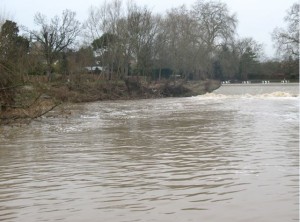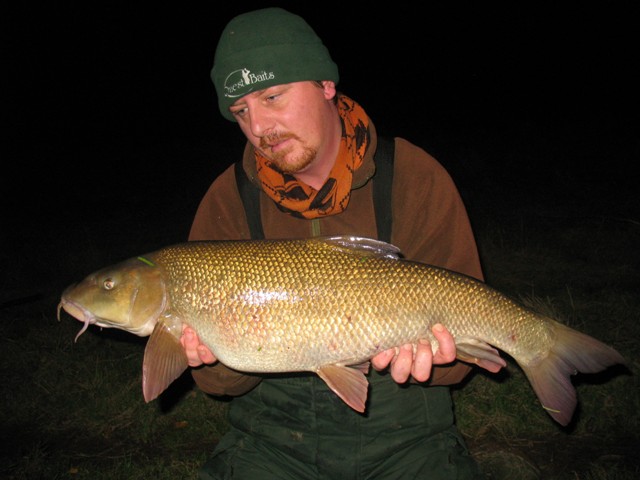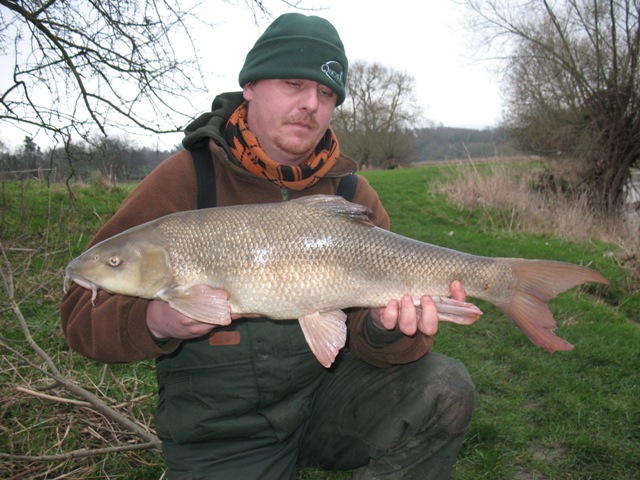Pat Gillett discusses a few of his thoughts on the quest for barbel in winter, how to pick your spot and take advantage of the climate.
I was talking to one of my match angling friends at the other day and he was asking me how I go about locating barbel in the winter, especially on the stretches that I fish, which in general do not hold that many fish.

- Warm, high coloured water - perfect!
Most of this guys’ fishing is done on the Middle Severn or River Wye on stretches that hold loads of barbel and other fish. As long as you fish sensibly on areas like the Middle Severn you can catch barbel in literally any conditions. I used to do it myself years ago and have caught barbel with a river temperature of as low as 3.0 Degrees C and an air temperature of 0 Degrees C.
Pick a swim that you know is a hotspot (holds lots of barbel), feed little and often with maggots and you will catch the odd fish even in extreme conditions. This is very similar to the advice a lot of anglers give about winter carp fishing - “For a chance of consistent sport pick a water that holds a large number of carp and avoid the hard waters with a low stock density.” This applies to barbel also, pick a prolific stretch and you have far greater chance of catching a barbel.

However I digress, as I was going to share my thoughts of how I tackle the fishing on the stretches that I frequent. I no longer fish areas that hold lots of fish so my fishing is totally different to that of my match fishing friend. The first thing that I do now is closely monitor the weather. If the conditions are totally adverse to barbel fishing I now prefer to fish for other species that will still feed properly, pike and chub for example. If I can see a rising river temperature of 5.5 Deg. C (preferably 6 Deg. C +) then it will be time to get the barbel rods out. If this is coupled with rising river levels then so much the better.

- Mini pellet mix
Stick to a proven winter bait, winter is not really the time to experiment unless you have found an area with a lot of fish. I would recommend the Quest Baits Rahja Spice and the Special Crab with matching pastes, the latter of which has caught me loads of winter barbel over many winters (in fact, I have taken winter fish of 11lb+ from the five rivers that I have used it on.) This winter I am also keen to try the new Absolute Range of boilies from Quest, having just taken a nice brace of doubles on the Absolute Seafood.
When visiting a stretch for the first time, my standard approach would be to fish a 10mm boilie or a cut down 15mm bait. This will be wrapped in a matching paste. I will add 3 x ½ baits on a pva stringer. This will all be fished in conjunction with a feeder carrying the mini pellet mix. Using this method (and adding no extra free bait), I would have one cast in each swim that I fancy and generally only stay there for 45 minutes (this is plenty long enough to get a few knocks if barbel are present). On the first couple of trips I would even change swims if I have caught a fish, as I am trying to build up a picture in my mind of a number of swims, thus giving me a few different catching areas. The only downfall with this method is that in the winter the feeding spells can be very short (maybe only an hour) so that by moving about a lot you maybe in a swim that contains no barbel for that short feeding spell. This is worth risking for the first few trips though, as when you have found a few barbel holding spots you can then make sure you are fishing one during a feeding spell.

- A chunky Lower Severn barbel of 13lb+, caught after the bait had been in for 1 ½ hours.
Once I have found a few barbel holding areas I am prepared to fish in one swim for the whole of the session, only moving if other anglers are catching and I am not. Whilst fishing, unless the conditions are absolutely spot on, I keep the bait to the bare minimum, as described above, and try to keep the recasting down to say every 1 ½ to 2 hours if possible. I will throw a few baits in when finished (but only a few, as I don’t want to spoil the fishing for others or myself).
Talking about bait, there seems to be a common misconception that in high coloured water you have to use large smelly baits (such as huge chunks of Luncheon Meat) to catch fish. I have found this to be far from the case. Large baits are good when the water temp is still relatively high, but as the winter progresses and the water temperature drops below 7 Deg. C, I have found that even in highly coloured bank high flood water a good quality chopped down boilie / paste wrap will outscore everything else. This has been proven over many winters now.

- A ‘washed out’ – high coloured water Warwickshire Avon double – 1 of 7 fish (3 doubles) caught on a February afternoon.
So there are a few of my thoughts on winter barbel fishing. Up until the last few seasons I never used to fish for barbel until October and I still think the Winter can offer the best fishing (certainly quieter banks and the fish are in peak condition). On many winter afternoons I have taken a brace of doubles or more with only me and my mate on the stretch we were fishing. Stick to a proven bait, keep a close eye on weather and river conditions (can be a small window of opportunity), be prepared to move about and find the fish and you can have some really good barbel sport.
Cheers,
Pat Gillett
Pat Gillett

No comments:
Post a Comment